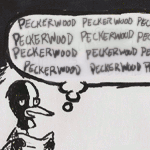|
MsJoelBoxer posted:Did you attend the SAA conference in DC in April? If so, did you hear any papers that you found to be particularly compelling? I did not. I've this conspiracy of coincidences that's kept me away from SAA for the past few years. But you should know that the SAA annual conference ends with a dance. Like prom. And SAA is what I'll generously call a heavily-tenured conference, so it's well worth the trip to see Stephen Greenblatt close dance with Margarita de Grazia through a block of Wilson Phillips. Or to see a recently-divorced senior member of the Texas A&M faculty make out with a recently-graduated former student. So even when I go, I try hard to forget.
|
|
|
|

|
| # ? Apr 20, 2024 09:36 |
|
I see that you're adding footnotes to your posts on an internet comedy site. Why aren't you using MLA format?
|
|
|
|
Brainworm posted:I did not. I've this conspiracy of coincidences that's kept me away from SAA for the past few years.
|
|
|
|
What is a overarching motif/theme of English literature?
|
|
|
|
emys posted:What do you think of this? I came across it in a collection of Wittgenstein's marginalia. Wittgenstein posted:The reason why I cannot understand Shakespeare is that I want to find symmetry in all this asymmetry. My knee-jerk reaction is that Wittgenstein is a strong and perceptive reader of Shakespeare. Shakespeare's drama doesn't have much calculated symmetry. The gun on stage in Act I doesn't go off in Act V. And this is one of Shakespeare's great strengths as a writer; because he's not invested in neatness, his plays capture an incredible breadth of human experience. If they were sketches, they'd be late Picasso -- a complex image that emerges from a single line, and remarkable because its casual precision betrays a shocking expertise. This is easy to miss, though, because when we read a "neat" Shakespearean ending (where everybody gets married or everybody dies) it's easy to underread the ways those endings get complicated. Take Midsummer. It opens with Theseus and Hippolyta's wedding fast approaching, and we quickly learn that Hippolyta is Theseus's favorite prisoner of war. So he's (a) way more into the marriage than she is and (b) completely obtuse -- he doesn't see that she's marrying him only reluctantly, even though she drops plenty of hints. So that's the gun in Act I. And we've seen this plot often enough to know how it should end. Theseus should develop a sensitivity to Hippolyta's feelings that in turn makes her reappraise him, and they should both march down the aisle at least cautiously optimistic if not deeply in love. Bang. Except that doesn't happen. The next time we see Theseus and Hippolyta, they're getting ready to go hunting and Theseus is bragging about his hounds. Hippolyta, maybe because she's an Amazon, is all about hunting, and for the first time she acts interested in something Theseus is saying or doing. But then some stuff comes up and Theseus decides to call off the hunt and head back to Athens. And then they get married. The same kind of thing happens with some of the play's other couples. Titania ends Act IV suspecting Oberon's been up to no good -- she wakes up not remembering much and suspicious for the loss of her Indian boy (the original cause of their quarreling in the play, though it quickly escalates to mutual accusations of infidelity). She asks Oberon to explain how all this might have come to pass, and even though he doesn't answer, we get the sense she's going to keep asking. Likewise, Demetrius only marries Helena because Puck slipped him some magic flower roofies -- of course Demetrius doesn't know this and his chemically-enhanced love is so intense that he wouldn't care, but Helena seems uneasy about the whole thing. Her line is "I have found Demetrius like a jewel,/ Mine own and not mine own." In other words, her marriage is uneasy. She's in possession of Demetrius, but suspects he may really belong to someone else. So in a play that has tons of parallel structure (there are five plots, all involving conspicuously different types of romantic relationships), we get an ending that isn't tidy. Sure, everyone gets married (or reconciles), but none of these couples' problems have really been solved. Hippolyta still resents marrying Theseus, Titania's eventually going to find out her husband and his friend drugged her so they could kidnap her adopted child (setting her up to publicly make out with an idiot man-donkey in the process), and Helena presumably has to live the rest of her life wondering when Demetrius's mood's going to change. So Wittgenstein is right on, I think. Shakespeare isn't tidy. There isn't symmetry. But that's kind of the point. If Midsummer have five relationships that all reconciled nicely, it wouldn't be nearly as interesting or nearly as much fun.
|
|
|
|
Glowskull posted:That's the thing: I'm beginning to think this is true, and it's giving me a bit of a crisis. I've been doing a lot of self-directed, upper-level work with professors, and I'm beginning to realize I have a serious taste for it. She's an ugly mistress, but she's good in bed. Then your course of action is clear. Find a trophy mistress for your nine to five, and keep this one a close secret in a locked bedroom. Just for clarity's sake: in this conceit, the trophy daytime mistress is the career that gets you all the things you want in your public life, like money and respect. The ugly one with the magic holes is what you do when you do who you want, i.e. a hobby. Also, the locked bedroom is the part of your life where you do the things you enjoy but keep secret, while the rest of the house is your public life. The implied remaining, unlocked bedrooms represent as yet undiscovered intellectual pursuits that deliver vaguely sensual and decidedly sexist rewards, which you may or may not decide to keep private (lock). Your trophy mistress would presumably have her own unlocked bedroom and share the house with you, but it's also possible she'll want her own place.
|
|
|
|
How hard did you find it to land a tenure-track position at a college/university? All I ever hear from people I know who are or were planning to go into doctoral programs, especially in the social sciences, humanities, and English, is how horribly glutted with PhDs all these fields are and how many people get caught in a hellish cycle of adjunct work and their careers stall and go nowhere. Did you find that you had to take extraordinary measures to get published early/go to an extremely good doctoral program to avoid this? Do you have friends from your time as a graduate student who are having similar career difficulties? What's your general opinion on whether or not it's practical to pursue a career as an academic if you aren't coming out of an absolutely top-flight program? Any chance of letting us know where you got your PhD? Also, what exactly is involved with consulting work as an English professor (which you mentioned before as a source of income for you?)
|
|
|
|
Orestes Mantra posted:What do you think of the modern university's policy of exploiting bright eyed graduate students in the humanities to take up the teaching load, save labor costs, and bring in more tuition money so that they don't have to actually pay for tenure track positions? Um. I don't like it? In all seriousness. I was a grad student, exploited, and so on. I know that system and I'm not far from it. Here's the thing: Grad schools fall into about two categories: you've got the "teach three or four courses a year for about $8K plus tuition remission" and the "teach two courses a year for about $16K plus tuition remission." The first is a terrible deal and nobody should ever take it. The second is more common, and it's tough to call it exploitative -- usually, it comes with health benefits (either on the faculty or student plan, and buy in costs about $1K/yr). That's not a bad deal for a part time job on a nine-month contract. Keep in mind that the median salary for an Assistant Professor in the humanities is about $48K, and the median teaching load is about five courses a year (and approaching six). Community college profs do nine or ten classes a year, and most R1s run a 2/2 or a 2/3; most liberal arts colleges run a 2/3 or 3/3, depending on class sizes. That's of course not the whole story, since a FT/TT position also carries an advising load and committee work, which are about a third of the job in terms of raw hours.* In short, it's tough to make a case for grad student exploitation. A tenure-track faculty member with a comparable teaching load would be 1/3 time, would make about $15-20K a year, would have committee and advising obligations on top of the teaching load, and wouldn't generally have health benefits, buy in or no. And an adjunct with that teaching load would make between $6K and $8K with no benefits and no promise of continued employment from semester to semester. That seems to be where the real exploitation's happening. Of course grad students are still cheap labor, but course for course they cost about as much as an Assistant Professor** and at least twice as much as adjuncts (who, keep in mind, are generally ABD and probably PhD holders). There are other exploitation issues with grad school -- programs admit tons of students knowing attrition is high, and plan on awarding more PhDs than the market can accommodate -- but that's not a problem exclusive to graduate education. *I'll leave research out of the equation for the time being, since it's necessary in both positions (though it's a professional obligation for a professor and the "student" part of being a grad student, and so probably shouldn't be figured in as salary-compensated work). I'll leave out the cash value of tuition remission, too. ** Again, excluding the value of tuition remission. But excluding the value of the AP's benefits, too.
|
|
|
|
I love this thread, and thank you for doing it. I have a couple of questions. I've been a huge reader my entire life, and I've always excelled at writing. However, what I've always loved doing is editing. It suits my nitpickiness and fulfills a basic need to be pedantic (though I understand that grammar sometimes needs to be extended or ignored for style). I don't know if it's something you can give advice on, but do you have any idea how to start a career as an editor? Right now I'm strongly considering a major in Latin, minor in Computer Science - both of which are areas that require pretty strong sense of syntax. My other question is on behalf of friends. In high school, I had one friend who was forbidden from using any form of the verb "to be". I've never had an English teacher or professor call me out on using it, unless it's part of an unnecessary passive construction. I just had a text from my girlfriend asking how she can use the verb "to be" less, because on a peer-edited paper every instance of "is" was underlined. Is this phobia of "to be" just an overreaction to the excess use of passive voice? And if it's not, is there a good way to avoid using it?
|
|
|
|
morethanjake32 posted:So this isn't related to anything else in the post, but I thought I'd ask anyway. There is a commercial on tv for Healthy Choice frozen dinners. In this ad a lady (I can't remember the actresses name) asks Julie Louie-Dreyfus if " She has ever seen a cow chewing cud?". I maintain that it should be phrased " She has ever seen a cow chewing it's cud?" Am I just being anal retentive about this, or am I wrong entirely? The best way to get at this is inductively, by checking your sentences against grammatically parallel constructions. So we get: Case A "Have you ever seen a coach chewing gum?" vs. "Have you ever seen a coach chewing his gum?" and Case B "Did you see Roger scratching his rear end?" vs. "Did you see Roger scratching rear end?" The difference between the two seems to be the nature of the verb -- particularly whether the verb is reflexive. That is, both verbs are transitive (they have an actor and an acted-upon*), so the question seems to be whether the verb itself implies that the actor and the acted-upon are necessarily affiliated. In this specific case, the reflexive relationship appears to be one of ownership. Consider these hypothetical questions: 1) Is it generally assumed that someone scratches something of his or hers / something he or she owns? and 2) Is it generally assumed that someone chews something of his or hers / something he or she owns? I'd say "no" to (1) and "yes" to (2), suggesting that "to chew" is reflexive in this possession or ownership context, and that, consequently, "have you ever seen a cow chewing cud" is acceptable usage. It's easy to make this mistake, though. Generally, verbs in English are made reflexive either through the addition of a prefix (like auto- or self-) or (more commonly) by addition of a reflexive pronoun (e.g. himself, herself or itself), which isn't the case with inherent or pronominal reflexives. * or agent/patient or subject/direct object, if you prefer. And if you want to get really specific, the issue is whether "to chew" is an inherent / pronominal reflexive, rather than, say, an auto- (or anti-) causative or reciprocal reflexive.
|
|
|
|
What do you consider to be the most respected and influential journals in English literature and, more specifically, in your field? Edit for follow-up: And how difficult would you say that it is to get published in them?
|
|
|
|
What's your favorite part of Paradise Lost?
|
|
|
|
Why does everyone hate Paradise Regained? I think it should stage a coup in the literary world.
|
|
|
|
Do you have any experience teaching high school, and if so, how does it compare? I've thought it might be nice to become a prof someday but all those postgrad years seem like such a lot of work.
|
|
|
|
lgcty5 posted:Slightly e/n: I'm going to take a tone here. Fair warning. 1) You need to work backwards. It sounds like what you're doing is saying "I need to do X, Y and Z," where X, Y, and Z are open-ended tasks -- that is, XYZ can take as much time as you're willing to put into them, because they've got definite deadlines but no other clear set of completion criteria. You don't have a way of calling them finished before the calendar says so. The way to manage these kinds of tasks is to decide how much time you'll allow them, and cut them off when that time runs out. Otherwise, they'll rule the rest of your life. I know what you're thinking. This means some things won't get done or won't be as good as they could be. But that assumes that every hour is somehow equally productive, that you never hit a point where time investments yield diminishing returns. But regardless of whether that's true, letting your work rule your life means you end up resenting your work, or at least feeling a bit guilty whenever you choose to do something else. It's just not a viable long-term strategy. Put another way, the whole point of (for instance) your writing is to learn. You're right in thinking that other people aren't going to be deeply satisfied with your work, because that's not the point of the work you're doing. It's not in the design. So if you start thinking of your work as a learning process rather than a process whose purpose is producing a product (like a paper), you'll be a lot happier. The learning process is the important thing. The written product is really a by-product, like gizzards or hot dogs. 2) The job market sucks, sure. But worrying isn't going to change it, and it'll just stress you out in the meantime. I've said before that there are lots of good people without jobs, and that's technically true. What I meant by that is that there are lots of unemployed but able scholars, and if they don't have jobs it's generally for a few reasons: a) They're lousy teachers. This doesn't matter if you want to work at an R1, but it does matter if you want to go where most of the jobs are. b) They're socially defective. This matters no matter where you go. The people interviewing you need to like you. They need to want to work with you because you'll make their lives better. A good litmus test is whether you can pick up a woman/man/child in a situation where alcohol isn't involved, like at the grocery store. If you can, you're probably likable enough to get over the bar. If not, or if it hasn't occurred to you to try, you need to practice making other people want you around. c) They're competing on the strength of their research in an arena packed full of excellent researchers. This is like any other job. If you want to get hired on the strength of your qualifications, you're probably not going to get hired. There's only one most-accomplished applicant, and you're probably not her. So what can you do? Be the person that everyone wants to work with, because you're personable and interesting and have good ideas.* 3) How did things change for me? They really didn't. I liked grad school. I spent my eight a day teaching, taking classes, and researching stuff I love, and the rest of the time doing other things.** I bought a house in little Puerto Rico and rented rooms to friends. I went to lovely bars and drank warm Yuengling. I got mugged in Shanghai. I went on blind dates with chain-smoking women who wore body glitter and had caesarean scars. The point: what I do for a living changed when I went from being a grad student to being a professor, along with the paycheck and the responsibilities. And those give me more options for living the rest of my life. So in that sense, things are better. But you can't let grad school make you forget what it's like to have a life outside your education and your job, because that's exactly the kind of thing that'll make being around you an obligation instead of an opportunity. * This, incidentally, also means not being the guy who keeps asking "When will my misery end? When will I know death's sweet embrace?" ** People.
|
|
|
|
This was a more interesting thread than I expected. Will you weigh in with your opinion on using "they" as a 3rd person singular gender neutral pronoun?
|
|
|
|
Brainworm posted:Then your course of action is clear. Find a trophy mistress for your nine to five, and keep this one a close secret in a locked bedroom. A+. The more I think about it the more I realize it's a bad situation either way. I just got my final grades and some good feedback. They looked promising. I don't really know if it's a hobby when I think about it during my free time for a good part of the day. The law school "trophy mistress" is looking like she'd run off with my money. I think I may go for it. I've thought a lot the past few weeks and I think I would be happier staying with English. It's quite a situation. basement jihadist fucked around with this message at 02:29 on May 6, 2009 |
|
|
|
Glazzy posted:How did you become a professor? I'm going to call this a motivation question instead of a process question -- I mean, the how is easy. Went to grad school, looked for jobs. The motivation's trickier. I love what I do, but it's also a compromise between a constellation of academic and non-academic priorities, such as: * I don't like unilateral decisions, even when I make them. There's this thing that happens, where the people who didn't like the decision before it was made still don't like it afterward, and it gets tough to get them invested in what needs to be done to make the decision work. At least at my college, decisions happen in committee and after broad consultation, which is one way of sidestepping this problem. I've never been in a business where that's the case, excepting super-small operations. And of course that brings in its own problem set. * I want to work in a nice place. There are businesses with nice campuses, but even the nicest don't rival a decent college. Apart from the scenery and some excellent old buildings, there's good food service, a nice gym, and a slew of interesting people who like talking about ideas. That's tough to find anywhere. * My work is almost entirely self-directed. I've got friends who (figuratively) shoot in their pants about interviewing with Google because they get to spend a fifth of their time working on their own projects. I spend about a fifth of my time working on things that aren't my own projects. * I'm a vegan. Your only hopes for convenient shopping and a like-minded community on that front are living in a pretty large city or being part of a college community. * I've got a lot of intellectual interests and I like solving interesting problems. Today, I was working on that Horsham Dragon matter and wanted to talk to a herpetologist (specifically, someone who knows the species history and migration paths of monitor lizards), someone who'd have some experience locating and going through 17th century shipping manifests, and someone who had a detailed knowledge of English trade relationships with New Guinea. Two of these three people work in my building. I come up with this kind of consultation maybe once a week, and I'm party to this kind of consultation almost every day. I'm not going to pretend that isn't awesome. prussian advisor posted:How hard did you find it to land a tenure-track position at a college/university? [...] I'ma group this into a couple points: 1) I went to Lehigh University, which is a bottom-ranked program. But I went because they really wanted me there and because I was interested in working with a specific Renaissance scholar. And because their job placement rate was the best I could find. I know it sounds counterintuitive, but the program you come from matters a lot less than what you do while you're there -- not just in terms of writing and research, but in terms of developing relationships with other scholars and learning how different parts of a university work. Look at any top-notch program, and you'll see degrees from all over the place, and for good reason. The academic world's small enough that everyone has a knowable reputation. 2) For me, finding a job was easy. I had a few good offers, and a couple ones I could have taken if nothing else came in. But I've also got friends -- from my program and elsewhere -- that either haven't found jobs or haven't found jobs they're happy with. Year to year, the search is a crapshoot. Right now, for instance, almost everyone's in a hiring freeze so lots of new PhDs are stranded. The people I know who did well on the market all have one thing in common, though. They're likeable. You'd want to work with them, and you'd want to be in a classroom with them. I can't overstate how much this matters. We were hiring for a position in the English department this year and had about 300 applicants. Of those, about 70 were really good fits (they had the primary fields we were looking for, plus at least one of the secondary fields we wanted). The thing that took the top twenty or so down to the top three (and for that matter, down to the top one) was personality. Every one of these candidates knew their stuff, and every one of them could have done the job and likely done it well. So it really came down to who the staff and the faculty would most like to talk to every day, and who best communicated with the students.
|
|
|
|
Here's a strange one for you. I know this isn't quite your specialty, but is there any contemporary literature (say, from 1950 onward) that you suspect future historians will regard as the classics of our time? Flash forward to an English Lit class at Tranquility Base University in the year 2309. What 20th and 21st century authors will your silver-jumpsuited counterpart remember in one breath with the Bard? Will the class discuss Robert Heinlein and Arthur C. Clarke? J.D. Salinger and William Golding? Beverly Cleary and Judy Blume? Stephen King and Dean Koontz? Or even... J.K. Rowling and Stephanie Meyer?
|
|
|
|
Brainworm posted:If you're looking to get a job, go to law school. Here's my question: In your years of teaching, what fascinating truths have you learned about college students? [I just finished my first year teaching comp, and I learned that freshmen at my school (small artsy fartsy niche) are Romantics with a capital R. They believe in purest natural "free expression" springing forth from them fully formed and beautiful if they can only cast aside pesky constraints like "society."]
|
|
|
|
Manky posted:I love this thread, and thank you for doing it. I have a couple of questions. It sounds like what you really enjoy is proofreading. An editor, academic or otherwise, basically has two jobs. He or she accepts manuscripts for publication based on a detailed working knowledge of some part of the literary marketplace, and suggests substantive changes to those manuscripts based on that field knowledge. Grammar doesn't make an appearance. It's difficult to find a good, full-time proofing job, mostly because professional writers are generally familiar with the conventions of written English and because improvements in publishing technology mean that the process of converting manuscripts into galleys (the documents that suggest how a manuscript will be formatted in print) does not introduce the kinds of errors it used to. And professional proofers work fast. Really fast. As in 1200-1500 proofed pages per day. But proofing, especially around a college, can be a great sideline. Everyone's writing, and academic publishers generally have authors proof their own galleys. And you can charge anxious dissertation writers a couple bucks a page to proof their drafts, since most of them are under the mistaken impression that their comma placement is going to make or break a 400-page research project. quote:My other question is on behalf of friends. In high school, I had one friend who was forbidden from using any form of the verb "to be". I've never had an English teacher or professor call me out on using it, unless it's part of an unnecessary passive construction. I just had a text from my girlfriend asking how she can use the verb "to be" less, because on a peer-edited paper every instance of "is" was underlined. Is this phobia of "to be" just an overreaction to the excess use of passive voice? And if it's not, is there a good way to avoid using it? I do not understand high school English teachers and, frankly, am beginning to resent them. No "to be" verbs? That's up there with not using "I." Your idea about this crackrock rule coming from an overuse of the passive voice is probably spot on, since novice writes overuse the passive voice in misguided attempts to produce lengthy, academic-sounding sentences. Just keep her in the active voice unless she needs to avoid attributing an action to an actor (e.g. "war was waged"), and make sure she knows she owes you for this.
|
|
|
|
Bachaao posted:What do you consider to be the most respected and influential journals in English literature and, more specifically, in your field? For English in general, there's PMLA, which everybody gets and nobody reads. For Renaissance lit., English Literary History is probably the most prestigious, unless you're a New Historicist, in which case you want to get into Reflections. If you want to publish in a freely-available online journal, Early Modern Literary Studies is the oldest and the best, though it's kept the same formatting since like 1996. And if you've got something offbeat, the Journal for Early Modern Cultural Studies is a good home for it. Lots of younger scholars publish there. How tough is it to get in? I've been in a few of them. Perversely, EMLS probably publishes the best scholarship, and JEMCS is usually the most interesting read. The others don't do completely blind review, and so tend to favor more established researchers or people from the more prestigious R1s.
|
|
|
|
Triped posted:What's your favorite part of Paradise Lost? As a rule: Satan makes PL readable, since he's the only character with any interior and, frankly, any fathomable motivations. The relationship between Adam and Eve is marginally interesting, and anyone from Heaven is insufferably boring. But overall, I think Books I, II, and IV set standards that the rest of the text can't live up to. Pfirti86 posted:Why does everyone hate Paradise Regained? I think it should stage a coup in the literary world. See above. If you were going to judge Christianity by PL and PR, you'd come away thinking that the world's a terribly unjust place because Heaven is full of righteous know-it-all jackasses. End of humanity's idylls? Yeah, I saw it coming. So they're going to suffer because my nepotism created a sophisticated and intelligent foe they could not possibly outface, who's dedicated to destroying them because that'll hurt me. Because I love them. Love them enough to stand idly by while another creation of mine dooms them to endless suffering. Now I'll send Uriel, angel of the dawn, to lecture them on Ptolomaic astronomy.
|
|
|
|
dancehall posted:Do you have any experience teaching high school, and if so, how does it compare? I've thought it might be nice to become a prof someday but all those postgrad years seem like such a lot of work. In an average class, I'm sure I do at least five things that would get me fired from any high school in the US and, probably, the first world. Never, never, never, never, never.
|
|
|
|
Cool. Also, are there parts of any Shakespeare plays you still can't quite wrap your head around, that kind of nag at you sometimes?
|
|
|
|
modig posted:This was a more interesting thread than I expected. Will you weigh in with your opinion on using "they" as a 3rd person singular gender neutral pronoun? As long as it doesn't introduce ambiguity, I'm fine with it. Especially since other strategies for gender neutral writing are, strictly speaking, ridiculous. That said, you can almost always work around using "they" as a singular pronoun by making the balance of the sentence or clause plural, e.g. 1) I will send each student to his or her locker to get his or her copy of Tristram Shandy. 2) I will send each student to their locker to get their copy of Tristram Shandy. 3) I will send the students to their lockers to get their copies of Tristram Shandy. (3) is preferable to (1) or (2) and, in conversation or casual writing, (2) is perfectly servicable even though (1) is grammatically correct. I mean, to take a page from Strunk and White, would you say "the best tennis player in the room is I" or "the best tennis player in the room is me?" The second is clearly preferable even though the first is grammatically correct. It's a matter of ear. Keep this in mind if you ever consider using whom for any reason at all.
|
|
|
|
Powered Descent posted:I know this isn't quite your specialty, but is there any contemporary literature (say, from 1950 onward) that you suspect future historians will regard as the classics of our time? Flash forward to an English Lit class at Tranquility Base University in the year 2309. What 20th and 21st century authors will your silver-jumpsuited counterpart remember in one breath with the Bard? If I were betting, I'd split two ways: 1) Probably, people are going to remember the late 20th / early 21st as the infancy of recorded music, film, television, and various species of hypertext, regardless of whether those media produce any durable classics. 2) Of all the authors you've listed, Stephen King seems the most likely to win a place in the canon of American Naturalism. And he deserves it. It's worth remembering that most classics were commercial successes if not blockbusters -- that's a necessary, if not sufficient, condition for real durability. So that immediately excludes most avant-garde and academic novelists (and every post-1950 poet except Robert Frost). Second, King swims against the current. I'll exclude The Stand for a second. Most post-1950 genre innovations have involved human beings accidentally breaking the world, or at least the threat of the world being broken by some human action, deliberate or no. Think of SF time travel plots for a second. In, say, The Time Machine, Wells doesn't give a poo poo about causality. Instead, you get a more or less allegorical extension of Wells's contemporary social divisions. In that sense, the text is more like Swift's Modest Proposal than anything. But in any post-1950 time travel plot, the unwritten assumption is that people have the ability to irreparably break the world -- see "The Sound of Thunder" for an early example or, you know, any original time travel plot in film or television. This kind of anxiety pervades modern media, in one form or other, like you wouldn't believe. King, on the other hand, generally tells a completely different kind of story (BTW, inventing an entirely new novel subgenre in the process), in which sympathetic characters' basic humanity is menaced by a threat that, generally speaking, is not a consequence of human action. Carrie's not a threat because she's an outcast. She's a threat because she can kill people by thinking. And Cujo isn't a threat because he was a terribly abused dog who turned vicious. He gets rabies in a totally natural way and menaces a mom and kid for no good reason at all. Third, It's no small matter that (when he wasn't drunk or coked up) King's an extremely capable writer and versatile storyteller. Compare the way the story in Carrie is framed and forwarded to, well, any other author's first effort, and you'll see a huge difference. King has some real kung-fu, even if early success means he hasn't always needed to exercise it.
|
|
|
|
Excellent thread so far, keep it up. I have a personal Shakespeare fetish (spent my last three undergrad years tutoring it, still may go back for grad work), and on that note have a few questions for someone in the field right now: 1) I recently read Stephen Greenblatt's "Will in the World" and thought it was excellent on many counts. I've heard the theory before, but Mr. Greenblatt made it clear that he was convinced that Shakespeare at least dabbled in homosexual behavior and may have married solely for financial and social reasons. Your opinion? 2) What is your favorite play, and why? What is your least favorite, and why? 3) What is your opinion of 'modern' stage productions of the plays? I thought "Romeo+Juliet" was actually pretty good, since Leonardo DiCaprio captured Romeo's exuberant naivety perfectly, but they also retained the language. 4) Are there still things to write about Shakespeare that don't fall under the category of "reinterpreting meaning in a contemporary context"? E: I realized this is unclear. I'm not asking you to tell me a list of untouched categories - more like I'm wondering what the ratio of published articles is. Thanks in advance! e:^^^^^^ I used to disregard King until I read "On Writing". Still not a huge personal fan but it's great to see inside a working mind that way. Upright Sloth fucked around with this message at 17:12 on May 6, 2009 |
|
|
|
What do you think about the new(ish) literary Darwinism movement?
|
|
|
|
I'm getting my PhD in psych and just finished teaching my first class. I loved it and am absolutely floored by the whole experience, however I can see some of my shortfalls as a teacher and would love to get some advice from you: 1) How do you deal with quantifying some of the more subjective properties of a paper when making a rubric? My kids are writing research articles and things such as APA format, statistics, citing where they should are easy to grade. I have a hard time putting a number up for 'good writing' and backing it up. 2) How do you deal with kids who don't speak English as their first language? I have 2 kids who work hard but obviously don't have a firm grasp of grammar/syntax. It is hard for me to look past it. 3) Do you find it difficult dealing with grade inflation? I gave a girl an 87 on a paper and she came into my office hours for 2 days making me justify justify justify. 4) Maybe it is because it was my first class, but I sort of have an emotional attachment to my students. I try and grade all of their papers without looking at names and all that jazz, but my grade distribution shows surprisingly (to me) little variance. How do you/do you stay detached enough to be fair? Thanks for a great thread!
|
|
|
|
I'd love to know what your literary pet peeves are, whether they be grammar, spelling, punctuation or plot cliches.
|
|
|
|
Defenestration posted:Brainworm these are both terrible ideas to be spreading around given the current state of law. Especially the first. Hold up. I know the JD's not the lock on a high-paying career it used to be, but the job outlook for JDs is comparatively Edenic. The NALP puts the job placement rate for law students north of 90%. Those are one year placement rates, incidentally. The three year placement rate for English PhDs into Assistant professorships is south of 50%. Further, the median starting salary for an Assistant Professor of English (the highest paying position you can get straight out of grad school) is $48K. The median starting salary for a JD who goes into private practice (55% of them, incidentally) is $108K. Put simply, once you get an English PhD, you've got about a fifty/fifty shot at landing a tenure track position (median salary $48K) inside of three years. Your alternatives are adjuncting, part time work, or a non tenure-track full time position, all of which pay substantially less (MLA doesn't have medians on this, unfortunately, but the range would be between $12K and $20K, with no benefits). Once you have a JD, you've got about a fifty/fifty chance of landing a private practice job (median starting salary $108K). Your alternatives are business, government, etc, and the only options that pays less than an Assistant Professorship are public interest ($42K) and clerking ($40K). Both of those are about the top of the bottom quartile for Assistant Professorships. Put even more simply: If you get a JD, the worst case scenario, three years out, is that you'll make what an Assistant Professor makes (that is, you match the best case scenario for an English PhD). If you can't stand law, that's one thing, but it's irresponsible to think that the risks and rewards of graduating with either degree are somehow equal. Of course law means probably taking on debt. But a PhD takes an extra four years. For the sake of argument, I'm going to call that a wash. quote:Here's my question: That there's a huge, huge developmental range. Especially emotionally. Some of them are about what you describe -- that everyone is naturally good and valuable and it's social constraints that must make them something else. The other side of that is a sort of deep relativism, where it's somehow wrong, or at least not useful, to make value judgments. That's a bit ahead of teaching at Lehigh, where the overwhelming majority of students were mired in a sort of superficial certainty about everything. But I've also got students who are really capable of adult-level thought -- you know, "if you look at the problem this way, this is a workable solution, and if you look at it this other way, this other thing's a workable solution. So the real issue is creating solutions that don't hamstring our ability to try out later solutions, since out first solution's likely to be a failure we can learn from rather than something that effectively manages the problem." So there's that. There's also their view of adults in general and academics in particular. Simply put, it's strange. For instance, most of them assume that I must necessarily be dating someone else at the college, since obviously I'd only be interested in a woman because of her education and academic interests. This just has to run counter to whatever experience they already have.
|
|
|
|
Brainworm posted:As a rule: Satan makes PL readable, since he's the only character with any interior and, frankly, any fathomable motivations. The relationship between Adam and Eve is marginally interesting, and anyone from Heaven is insufferably boring. But overall, I think Books I, II, and IV set standards that the rest of the text can't live up to. Have you given serious consideration to putting 'schoolmaster of souls' as your job description
|
|
|
|
dancehall posted:Cool. Also, are there parts of any Shakespeare plays you still can't quite wrap your head around, that kind of nag at you sometimes? Tons. I'd run out of keyboard listing them all, but here are some starters. Pirates. Every time they show up in Shakespeare it's a little strange. Of course everyone knows the improbable pirate-related mishap that brings Hamlet back to Denmark after Claudius has sent him to England under Rosencrantz and Guildenstern's protection (ship attacked by pirates, Hamlet first to board and attack, ships separate, Hamlet taken prisoner and returned to Denmark, ransomless, for shadowy pirate reasons). But there are also the pirate pimps in Pericles, Prince of Tyre. We've kidnapped you, so first we'll rape you. Then we'll charge other people to rape you. Wait. You can sing showtunes? Just as good. Wine. Never, ever ask anyone for a cup of wine, because the in-scene mortality rate is 100%. Of course there's Gertrude in Hamlet, but the rule holds for Richard and George in Richard III, too. This has to be a running joke. Iago. I'm thinking about the famous matter of his motivation. If you believe everything he says about his revenge, he's missed a promotion and both Othello and Cassio have been tapping his wife, and he may be in love with Desdemona, too. There's too much there for all of it to be true, which calls all of it into question. And saying he's a sociopath, while true, names his behavior but doesn't explain it. Lear. This is a sloppy play all around. But where the hell does the fool go after Act III? Shakespeare's central characters generally don't pull vanishing acts. The Midsummer Donkey Show. Just how far does Titania go with that man-donkey? Titania and Oberon have an argument almost immediately before where it becomes clear that either of them will sleep with anything that moves; why tell us this immediately before Titania and the translated Bottom cuddle in a grassy bower? So, really, what do you do with the staging? Also, what happened to that Indian boy Titania and Oberon were fighting over? The Nightingale and the Lark. We all know this scene from R&J. Reread it and explain to me how this isn't a passive-aggressive lovers' quarrel. No, babe, you're right. It's a nightengale, so it's still night, even though it's really bright out. So since it's still night, I'll sit here and wait to be killed by your family. Really. You want me to move so my blood doesn't ruin the sheets? And now you're crying. Great. Of course nobody stages it this way. Hamlet II.i. Everyone cuts the first part of this scene, where Polonius sends Roderigo to spy on Laertes. But it's one of the most important parts of the early play, because it tells us something Hamlet already knows -- Polonius is the guy in charge of the king's spies, which are apparently everywhere. This is why Hamlet tells us he's going to affect an "antic disposition" in Act I (it gets him out of being carefully watched, which is likely if your paranoid uncle just murdered your father and wants to know if anyone, especially a candidate for the throne, has discovered this). More important, it shows that Polonius is possibly implicated in Old Hamlet's murder, and Hamlet needs to know for sure one way or the other so he has some idea who to kill. We know from Act I that the story behind Old Hamlet's death was that he was snakebit, so someone had to spread that story around and keep anyone from seeing the body, which the ghost tells us was covered with a crust of ulcers that snakebites generally don't cause. And someone had to fail to catch the plot to kill Old Hamlet in the first place. And it's awfully suspicious that Claudius has kept Polonius around after Old Hamlet's death. So Hamlet's strategy for dealing with Polonius is faking lovesickness for Opheila so severe that it approaches insanity, since Hamlet's inferred that Polonius has told Ophelia to stop seeing him. This distracts Polonius with an urgent personal problem (his daughter's upset and it's his fault) and a thorny political problem (how do I tell the queen that I've just done something that's driven her son insane?), which gives Hamlet space to investigate how deep the conspiracy surrounding his father's murder goes. This only makes sense of you know that Polonius is the guy in charge of the spies so why would anyone cut the thirty seconds that tell us the one thing we need to know to understand Hamlet's motivation for the first half of the loving play?
|
|
|
|
What do you think about Caliban?
|
|
|
|
Upright Sloth posted:1) I recently read Stephen Greenblatt's "Will in the World" and thought it was excellent on many counts. I've heard the theory before, but Mr. Greenblatt made it clear that he was convinced that Shakespeare at least dabbled in homosexual behavior and may have married solely for financial and social reasons. Your opinion? There are two issues here. But first a disclaimer: Critics' opinons on Shakespeare's marriage and sexuality say more about the critics than the evidence. But moving on: Shakespeare's Marriage. The thing that best explains Will's motivation to me is the birthdate of Will and Anne's first daughter, Susannah. It's about six months after the wedding -- a matter made more conspicuous by the wedding being rushed (they got permission to announce the marriage only one week in advance instead of the usual month). In this kind of situation, either Anne or her family could have secured an order to legally compel a marriage once discovering that Anne was pregnant. And it's possible that they either did this or threatened to, but what history there is has stayed quiet. So there might be some forced-marriage resentment there. And there's the Will-working-in-London-while-his-wife-stayed-in-Stratford matter -- not unusual at the time, but evidence they weren't inseparable. And there are plenty of stories, maybe apocryphal, of Will's philandering (he plays a part in a dirty joke whose punchline is "William the Conqueror came before Richard the Third," and William Davenant, Will's godson, claimed to be his illegitimate child; Will stayed at the Crown's Inn on his commute from Stratford to London, and Mrs. Davenant was the innkeeper's wife). But it's also worth remembering that when Will retired to Stratford (and his wife) in 1613, he probably thought he had another thirty years left -- he wasn't yet fifty. So my guess is that he was in a pretty typical situation. He loved his wife, and they shared a real intimacy (him leaving her their "second best bed" in his will seems more a sexual remembrance than a postmortal backhand). And he slept around. Most people do. Shakespeare's Bisexuality. I'm not sure the sonnets are good evidence, even by the really tenuous standards set by inferring biography through fiction. The whole point of the sonnets seems to be to mess with the form by introducing emotional complexity and the idea that love happens in ways that aren't rational and are generally self-destructive, or at least not self-serving. And the sonnets are barely homoerotic, at least by Renaissance standards. If you want homoerotic Renaissance poetry, check out Richard Barnfield's Affectionate Shepherd. Ricahrd Barnfield posted:If it be sinne to love a sweet-fac'd boy, quote:2) What is your favorite play, and why? What is your least favorite, and why? Hamlet is far and away my favorite. I think it would be everybody's favorite if everybody read it like an actor or a director would, because every character has a crux -- that is, some thing that the actor or the director absolutely has to know in order to get how the part works. When you stack these up, you can see how awesome this play is. For instance: When does Hamlet start going crazy for real? We know he's faking insanity from Act I forward, and (twist!) we find out he's lost it for real when he imagines seeing his father's ghost when he confronts Gertrude. So he goes from faking crazy to real crazy at some point during II or III. The actor needs to decide when this is, and how to best pull off the surprise-I'm-actually-nuts bit with Gertrude. Is Claudius Hamlet's real father, and does Claudius suspect he might be? Hamlet definitely suspects this -- the whole second half of his first soliloquy is where he comes to this realization (Gertrude married Claudius really quickly. It must be because she's a woman and women are fickle. But nobody's that fickle -- even "beasts" that want "reason." So the only possible explanation is that she was having an affair with Claudius. But why? Dad was a badass, and Claudius is no more like him than I am. Wait. How long has this affair been going on?). Does Hamlet know he's being watched in III.i (To be or not to be...)? He already knows Polonius is manipulating him (and presumably spying on him) using Ophelia, so it's reasonable that he could infer that she's only conveniently reading in the middle of the hallway because she's been put there (ergo, he's being watched). If he is, than TBONTB is an act, someone pretending to be semisuicidal to maintain an illusion of insanity. If he's not, then he's starting to slip. When does Claudius start to suspect that Hamlet's faking insanity? Right after TBONTB, Claudius says that this soliloquy and argument with Ophelia isn't how crazy people act (ergo, Hamlet's faking madness, ergo he has a reason to fake madness, ergo he's trying to distract us, and wouldn't do that if he didn't want Polonius and me to know what he's up to, ergo he suspects his father's murder) ergo Hamlet needs to go to England right loving now. How deeply is Polonius implicated in Old Hamlet's murder? He's all about spying, and he and Claudius are pretty tight. Does Gertrude either know or suspect that Old Hamlet was murdered? The ghost tells Hamlet that her conscience is going to punish her, but talks around the possibility she might be wrapped up in this whole kill-the-king conspiracy. And that's just for starters. Almost all of these are in orbit around the plot twists in Act III, which is even better. Lear might be my least favorite (at least of the major plays -- Shakespeare wrote a lot of dogs, like Henry VIII). Richard III is close, though -- it starts off so well and falls apart so completely once Shakespeare tries to give Richard a conscience. quote:3) What is your opinion of 'modern' stage productions of the plays? I thought "Romeo+Juliet" was actually pretty good, since Leonardo DiCaprio captured Romeo's exuberant naivety perfectly, but they also retained the language. Good productions are rare. I thought Patrick Stewart's last Macbeth was solid but, like most productions, it mixes great moments with unbearably stupid ideas. Rapping witches? Really? In a version of Macbeth set in a pseudo-Stalnist state? I feel this way about most productions, but I get way, way, way to frustrated by directorial decisions that clearly come out of not understanding how the play works (see that rant on cutting Hamlet I.ii). quote:4) Are there still things to write about Shakespeare that don't fall under the category of "reinterpreting meaning in a contemporary context"? E: I realized this is unclear. I'm not asking you to tell me a list of untouched categories - more like I'm wondering what the ratio of published articles is. Most scholarship now is actually deeply historicist, meaning that someone discovers the way a particular idea gets used in a minor text (like a pamphlet or a legal document) and uses that iteration of the idea to re-read how it works in a major author like Shakespeare. This can be good when it's well done, but it gets away from helping students and scholars develop a deep understanding of the plays. I mean, they're plays. The first thing you should do is read carefully to figure out e.g. character motivation. Once you've got a solid understanding of how the text works as a play, it makes sense to follow lines of historical reasoning that help develop that understanding.
|
|
|
|
LikeABell posted:What do you think about the new(ish) literary Darwinism movement? In short, no. Even if we assume for a moment that cultures select "classic" texts in a way we can productively discuss using a vocabulary of natural selection (knee-jerk reaction: we can't), the assumption behind LD seems to be that people (as in everyone, everywhere) share certain essential qualities that can be deduced from reading canonical literature, and seems only able to offer explanations to interesting questions in terms of universal statements. That, by itself, should be a warning. Put differently, LD seems to be philosophy disguised as literary criticism, since the real questions it asks aren't about how a texts works, but about e.g. "essential human nature." There's enough of that kind of bullshit in lit. crit. already. If it's not about the text, it doesn't go here.
|
|
|
|
Webman posted:I see that you're adding footnotes to your posts on an internet comedy site. Why aren't you using MLA format? Using MLA for hypertext is like trying to get a gun license so you can shoot porn.* ** *** * Because MLA describes a the formatting of hard text, and a forum is hypertext. Also, everyone in the real world uses Chicago style. ** Note both the wordplay and contextually appropriate phallic imagery, as well as the contradictions posed by licensing only one of these semantically and structurally similar activities. *** Also, I edited this message so you would be aware of how deep the loving around goes. Brainworm fucked around with this message at 21:55 on May 6, 2009 |
|
|
|
I recently saw a live performance of King Lear and I wasn't too impressed. Hamlet and Othello, for instance, are just so much better that I was actually somewhat surprised. Anyway, my question is why is King Lear your least favourite play? I can imagine a few reasons, but I'd really like to hear your thoughts on it. Also, what did you think of Kennith Brannaugh's Hamlet? ceaselessfuture fucked around with this message at 22:19 on May 6, 2009 |
|
|
|

|
| # ? Apr 20, 2024 09:36 |
|
Webman posted:I see that you're adding footnotes to your posts on an internet comedy site. Why aren't you using MLA format? I would rather have footnotes instead of parentheses all over the place (Not that there is anything wrong with parentheses (Although they are overused by inexperienced writers(However, they are helpful for stream of consciousness))) Brainworm posted:Using MLA for hypertext is like trying to get a gun license so you can shoot porn. But now that we're talking about hypertext, I was wondering what your thoughts are about it. From a literature point of view, it seems like a gimmicky idea that professors talk about so they seem more culturally relevant. But from a general humanities point of view, where do you see the "New Media" field ending up? Edit: To take things a bit farther, what do you think about things like this happening? NeekBerm fucked around with this message at 22:55 on May 6, 2009 |
|
|




























